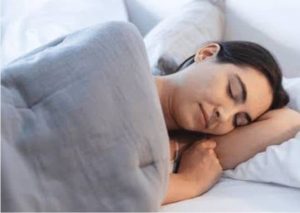By Badmus Aishat
 Sleeping is a complex and dynamic process that affects functionality in human systems which are explicitly explored by scientists. It plays a housekeeping role that removes toxins in the brain that build up while you are awake.
Sleeping is a complex and dynamic process that affects functionality in human systems which are explicitly explored by scientists. It plays a housekeeping role that removes toxins in the brain that build up while you are awake.
Research shows that a chronic lack of sleep or getting poor quality sleep, increases the risk of disorders including high blood pressure, cardiovascular disease, diabetes, depression, and obesity.
Sleeping plays a crucial role in tissue repair, hormone regulation, and overall health. Getting enough sleep boosts brain power, improves weight management, and reduces stress and inflammation.
Moreso ever, Empirical evidence showed that there were so many downsides as a result of sleeping less, including impairment in cognitive function and productivity, besides a significant reduction of stress levels. Long-term health problems include obesity, diabetes, and illness of the circulatory system. There are a lot of benefits to sleep, aside from the major aspect that helps our health keep in line.
Added to the physical and cognitive impacts of insufficient sleep, research is growing on the emotional and social impacts that lack of sleep could have. Most of the researchers have reported that mostly sleep-deprived individuals often score high in expressing negative emotions like anger, sadness, and loneliness.
They also score high in impulsiveness and risk behaviors. Indicating just how far-reaching this impact of sleep is, these emotional and social effects of sleep deprivation can be every bit as important as the physical and cognitive ones.
Conclusively, Sleep is rather important for the development of physical health, mind, and emotional prosperity.
Daily, deprivation of sleep has consequences both in a short and long perspective. All the above has served as good reasons for sleep to be put on the top of the to-do list and for a person to follow the recommended eight hours of sleep. Better knowledge of the science of sleep places one in a better position to exercise better judgment in lifestyle choices concerning sleep, and subsequently quality of life.
